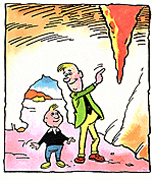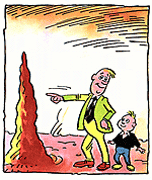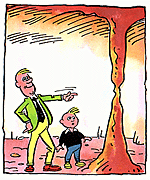Confusing Words Clarified: Group S; Homonyms, Homophones, Homographs, Synonyms, Polysemes, etc. +
(lists of "S" sections that are organized into what for some people are confusing groups of words)
English can be very confusing; for example, a house burns up as it burns down, a form is being filled in as it is being filled out, and an alarm goes off by going on. How about when the stars are out, they are visible, but when the lights are out, they are invisible?
As you examine the groups of words in this unit, you will find many examples of confusions; sometimes, just one or two letters in a word can change its meaning completely. There are also times when two different words get confused because their meanings apply to things that are very similar.
Efforts have been made to help you grasp the meanings of various words that may be confusing so you can utilize them with greater accuracy in your communication.
Your comments and suggestions are always welcome by writing to: E-mail Contact (just click it for an e-mail form) or by typing, [email protected], as the address in your e-mail heading.
If you have any problems understanding the pronunciation symbols, go to this Pronunciation Chart for clarifications.
2. To flow out with force: "The surgeon must be careful to make sure that the blood doesn't spout from the wound."
2. A sudden strong stream of liquid: "A spout of water was seen coming from the old pipe in the basement."
3. As an informal British usage, up the spout is a description of something that has completely failed, been ruined, etc.: "England has been experiencing an economy that is up the spout."
"The marriage of the couple is going up the spout [or down the drain]."
A British family recently installed a new rain spout, and then after a thunderstorm, they could see the water spout out of the spout as it flooded their garden. They were sure that they were up the spout because their cellar was also being flooded.
2. A small stream of water flowing naturally from the earth: "One of the advantages of being in the country is that we can see a spring here and there more often."
3. The season between winter and summer and the season when plants and trees begin to grow again: "Last year, we were fortunate to have a mild spring with adequate rain and sunshine."
4. A lively and energetic quality: "His grandmother, even at her age, had a great spring in her steps."
2. To move quickly to a different position: "If you stretch this rope and then release it, it will spring back into its original length."
3. An informal or slang expression meaning to help someone get out of or to escape from jail, prison, etc.: "The guy tried to forcefully spring his buddy from jail instead of waiting for a lawyer to legally spring his friend."
During their hike, they came across a small spring. In order to cross it, they were able to spring from one rock to another one across the stream because before a spring runoff, it is easier to cross a spring before it gets deeper.
2. A move in an American football game in which the ball is kicked so it bounces along the ground instead of up in the air: "He was the designated kicker for the squib at the beginning of the football game."
"Before the squid reaches the menu in restaurants, it is often referred to as calamari."
There was a short squib in the local newspaper about the new restaurant which is serving delicious squid meals. We often go for a squid dinner after a football game so we can celebrate the designated squib kicker's success.
2. A group of athletes which is managed by one individual or organization: "The manager of the boxing club had a stable of five boxers whom he was training to fight professionally."
"Her mental health was stable and she was encouraged to go back to work."
2. Not easily altered in terms of a chemical makeup: "The mixture in the test tube is stable and will not change when water is added."3. Secure, rational, or able to resist forces trying to move or to change something: "Once the crew had snugged the barrels to the deck, they were stable and would not roll around in the storm."
"Do you stable your horse here, too?"
2. A metal hoop or fine wire the purpose of which is to hold several items together: "Many people prefer to use a staple for each combination of pages rather than a paper clip."
3. A textile fiber of a short length that is spun into yarn: "The nylon staple will make an attractive yarn and the mother wants to use it to weave a scarf for her son."
"Did you staple the check to the form before mailing it? If you did, please unstaple it because the company gave instructions not to staple checks to anything."
The stable list of supplies for the office included a staple machine and boxes of staple(s). Users of the equipment were warned to be careful when they use the staple(s) so they don't staple any of them into their fingers.
"The bag of wheat was so heavy, the stevedore had to stagger when he picked it up."
2. To arrange in alternating or overlapping time periods: "Next week, the administration will stagger the work shifts of the nurses."2. To proceed or to spread out in a scattered or irregular group: "The search party will straggle and scatter to check the tall grass for the missing expensive bracelet."
She is aware that she normally tends to straggle behind the others when they are hiking, but today she will probably even stagger because she turned her ankle this morning which makes it much more difficult for her to walk.
2. To have lived or resided in some location: "We stayed in a lovely Bed and Breakfast near the river for our vacation."
3. To stop or to delay a proceeding, often in a legal context.: "The judge stayed the court order until she heard the new evidence."
Because of his important responsibilities, the officer always stayed staid throughout his career.
2. To be conspicuous; to stand out: "According to my mother, who was a teacher, split infinitives would simply leap off the page and stare her in the face."
Please don't stare at me as I limp up one stair at a time, because I hurt my foot this morning.
2. The use of a post to which an individual was tied in anticipation of an execution; a primitive form of capital punishment: "The traitor was tied to the stake and left to die."
3. The prize in a competition or contest: "All of the teachers contributed to the stake for the student competition in their school."
"We bought a frozen steak at the butcher shop which we will grill when the weather gets warmer."
Her father always kept a steak stake handy for roasting beef over the charcoal burner in the back yard during the summer.
Remember, the stake for winning the marathon is two tickets to go to a BBQ and have a steak of your choice, BBQ'ed to your preference.
 |
 |
 |
| This is a stalactite. | This is a stalagmite. | Uh, this is a stalemate. |
A stalactite holds tight to the ceiling while a stalagmite just might reach up to the ceiling.
There were some spelunkers who were at a stalemate because when they saw a stalactite and a stalagmite formed together as one unit; they finally decided that what they had discovered was a stalacto-stalagmite.
2. To walk in a stiff manner: "When the police officer was concentrating, he seemed to stalk about the office as if he were angry."
As part of a jungle expedition, the cameraman acted like a stalker who was trying to stalk strange insects. Once he saw a beautiful butterfly land on the stalk of a very unusual plant.
"The county agent will use a stamp on his tax bill to indicate that he has paid his taxes for the year."
2. A distinctive characteristic.: "The farm had a dreary stamp about it because of the unpainted buildings."The postage stamp on the letter that she received had not been cancelled; so, she used it again to mail a note to a friend, inviting him to participate in a stomp at the local youth club. She also used a custom designed stamp to seal the letter.
"During the negotiations, the mayor maintained a neutral stance."
2. A way of standing: "Her son had a stiff stance as he was being scolded by his father."2. To impede the apparent course of something: "The mayor said she would staunch the wave of crime in the city."
The political opposition tried to staunch the publicity of the candidate who was outlining her stance on several important issues.
2. A sparkling space object; especially, one in a certain position which is believed in astrology to influence the lives of people: "Considering all of the bad things that have happened to her, she is convinced that she was born under an unlucky star."
3. Someone who is the most important and well-known performer in a movie, play, opera, etc.: "He's the star of this and several other movies and he's even a star in stage plays."
When the famous movie star died, there were those who said that there was a new star in the sky honoring her memory. She really would have liked such an opportunity to star in such a celestial role.
Keep in mind that although a movie star may be beautiful or very handsome, the stars in space have a greater attraction.
The word star is generally a Germanic word, with relatives in German stern; as seen in, Dutch ster, Swedish stjarna, and Danish stjerne.
The modern usage or figurative sense of a person of brilliant reputation or celebrity as a star is first recorded in English in 1824, and was originally used in theatrical language in reference to a leading actor, singer, or other performer. The term film star came into usage in 1941 and movie star appeared in 1919.
2. Showing up in a conspicuous, or not so obvious, manner: "The error was staring me in the face all the time and I did not see it."
2. To feature with prominence: "She read that the new play is starring her favorite actor."
3. To decorate with stars: "She was starring the ceiling in the bedroom to make it look peaceful."
She kept staring at the movie poster and she could not believe that her favorite romantic actor was starring in a horror film.
2. Primarily in the U.S., newly successful people, businesses, etc.: "A few years ago, several guys had successful start-ups with their internet companies."
The political upstart used a special grant from the government as start-up money for a new business. There were rumors about the uncouth upstarts whose start-ups were making huge fortunes.
![]() Confusing Words: Homonyms, Homophones, and Homographs; explained and demonstrated.
Confusing Words: Homonyms, Homophones, and Homographs; explained and demonstrated.
![]() Confusing Words: Units, Groups A to Z.
Confusing Words: Units, Groups A to Z.
![]() Confusing Words: Vocabulary Quizzes Listed.
Confusing Words: Vocabulary Quizzes Listed.


